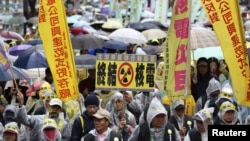TAIPEI —
Waves of demonstrators have turned out in Taiwan to call for an end to nuclear power, while the island’s government says it needs nuclear energy to supply power and will start up a fourth plant once it passes safety checks.
Some 130,000 protesters around Taiwan took to rainy streets on Saturday to call for the closure of three aging nuclear power plants and the decommissioning of a fourth that has not started operations. Their appeal to public safety, coming ahead of Tuesday's third anniversary of Japan's Fukushima nuclear disaster, was met with a government response signaling that nuclear power will go ahead for now.
Lin Hung-chih, deputy secretary general of the ruling Nationalist Party’s Central Policy Committee, said the island's nuclear program is safe. He said that Taiwan’s first, second and third nuclear plants, compared internationally, rank among the top and could not cause problems as they have been operating for so long. As for the safety of the fourth plant, he said that in addition to a ministry of economic affairs inspection, Taiwan’s Atomic Energy Commission will continuously make checks. An international organization will perform safety tests as well.
Taiwan has a large industrial base, and cabinet spokesman Sun Lih-chyun said Saturday nuclear energy must continue for now. He said that the unfinished No. 4 plant could start up once its safety is assured. Construction began in 1999 and has cost $9.3 billion, due in part to delays sparked by popular opposition.
Some of Taiwan’s biggest demonstrations have been held since the March 11, 2011 nuclear catastrophe in Japan following an earthquake. Officials reacted in the past by saying they hope to eventually scrap nuclear power and that voters could decide whether to go ahead with the fourth plant. There is no timeline for scaling back nuclear power however, and hopes for a nuclear power referendum dimmed last year because of legal barriers.
Taiwan’s operating nuclear plants date back to the 1970s and contribute 12 percent of the island’s power generation.
Anti-nuclear demonstration media liaison Liu Hui-min said the government is sticking with outdated positions. She said the government has taken no action to promote a referendum and instead has called for going ahead with the fourth nuclear plant. Liu said that besides talk of strict nuclear inspections, other positions have never been relaxed or adjusted to accommodate public opinion or the real situation.
Protesters plan to focus now on liberalizing Taiwan’s referendum law and identifying anti-nuclear candidates in local elections later this year.
Some 130,000 protesters around Taiwan took to rainy streets on Saturday to call for the closure of three aging nuclear power plants and the decommissioning of a fourth that has not started operations. Their appeal to public safety, coming ahead of Tuesday's third anniversary of Japan's Fukushima nuclear disaster, was met with a government response signaling that nuclear power will go ahead for now.
Lin Hung-chih, deputy secretary general of the ruling Nationalist Party’s Central Policy Committee, said the island's nuclear program is safe. He said that Taiwan’s first, second and third nuclear plants, compared internationally, rank among the top and could not cause problems as they have been operating for so long. As for the safety of the fourth plant, he said that in addition to a ministry of economic affairs inspection, Taiwan’s Atomic Energy Commission will continuously make checks. An international organization will perform safety tests as well.
Taiwan has a large industrial base, and cabinet spokesman Sun Lih-chyun said Saturday nuclear energy must continue for now. He said that the unfinished No. 4 plant could start up once its safety is assured. Construction began in 1999 and has cost $9.3 billion, due in part to delays sparked by popular opposition.
Some of Taiwan’s biggest demonstrations have been held since the March 11, 2011 nuclear catastrophe in Japan following an earthquake. Officials reacted in the past by saying they hope to eventually scrap nuclear power and that voters could decide whether to go ahead with the fourth plant. There is no timeline for scaling back nuclear power however, and hopes for a nuclear power referendum dimmed last year because of legal barriers.
Taiwan’s operating nuclear plants date back to the 1970s and contribute 12 percent of the island’s power generation.
Anti-nuclear demonstration media liaison Liu Hui-min said the government is sticking with outdated positions. She said the government has taken no action to promote a referendum and instead has called for going ahead with the fourth nuclear plant. Liu said that besides talk of strict nuclear inspections, other positions have never been relaxed or adjusted to accommodate public opinion or the real situation.
Protesters plan to focus now on liberalizing Taiwan’s referendum law and identifying anti-nuclear candidates in local elections later this year.
